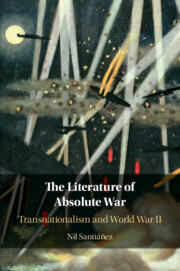Chapter Two - Terror
Published online by Cambridge University Press: 30 April 2020
Summary
Chapter Two shifts the attention from the combatants to the civilians under fire. After an introductory section in which I summarize the theory of strategic bombing and the milestones of the air war in Europe and Japan in 1940-45, I move on to analyze the catastrophic modernism deployed to narrate the aerial bombing of Germany, France, and Britain. I concentrate on Gert Ledig’s Vergeltung (1956), Alexander Kluge’s Der Luftangriff auf Halberstadt am 8. April 1945 (1977), Louis-Ferdinand Céline’s Féerie pour une autre fois (1952-54), and James Hanley’s No Directions (1943). Following my discussion of the catastrophic modernism of these works, there comes a section on realist works on the aerial bombing of Britain and Germany; in this section I include, too, modernist texts endowed with a strong representational drive. I analyze novels by Graham Greene, Elizabeth Bowen, Henry Green, and Otto Erich Kiesel. In Chapter Two I also explore in detail the narrative voiding of aerial bombing in Kurt Vonnegut’s Slaughterhouse-Five (1969) and Hubert Fichte’s Detlevs Imitationen “Grünspan” (1971). This chapter ends with an analysis of the representation of the atomic bombing of Hiroshima and Nagasaki in works by Yōko Ōta, Tamiki Hara, Masuji Ibuse, and Takashi Nagai, among others.
Keywords
- Type
- Chapter
- Information
- The Literature of Absolute WarTransnationalism and World War II, pp. 106 - 169Publisher: Cambridge University PressPrint publication year: 2020

